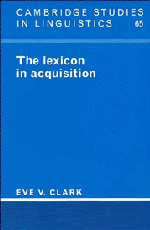13 - Issues for acquisition
Published online by Cambridge University Press: 05 July 2011
Summary
This investigation into children's acquisition of the lexicon raises a number of issues. Some are clarified by the findings discussed here; others require more investigation before they can be resolved. I begin by summarizing what the research on lexical development and word formation has revealed about acquisitional principles. I then take up three issues pertinent to all research on language use – the relation between production and comprehension, the representation of linguistic knowledge in memory, and the relation between structure and process in theories of language and language acquisition.
Lexical acquisition
Let me summarize what we have learnt: As children acquire words, they make few obvious errors, and they appear not to find the task a taxing one. Children acquiring very different languages appear to go through the same initial steps and rely on the same ontological categories (Chapters 2 and 3). They begin by producing just a few words and add to them slowly for the first few months; they over-extend many early words to other referents with similar properties. From early on, they build up semantic fields, adding further terms to each domain as they elaborate their vocabularies.
Conventionality and contrast
Yet the process of acquisition is a complex one. As children add words to their repertoires, they act as if every new word differs in meaning from those already acquired. They rely on the principle of contrast, that every difference in form marks a difference in meaning.
- Type
- Chapter
- Information
- The Lexicon in Acquisition , pp. 241 - 259Publisher: Cambridge University PressPrint publication year: 1993



